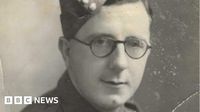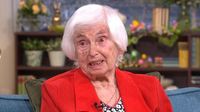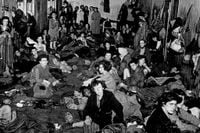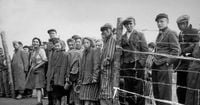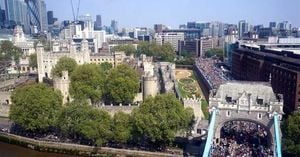The daughter of a British soldier who helped liberate the Bergen-Belsen concentration camp exactly 80 years ago said the "horrendous" scenes he witnessed there had changed his views about World War Two. Gunner Herbert Hurst, from Rossendale in Lancashire, was 36 when he entered the camp in Nazi Germany on 15 April 1945.
"Before he went into Belsen, he didn't see the point of the war," explained Barbara Bell. "But when he saw the horror there - all the naked bodies piled up - he knew Adolf Hitler had to be defeated." Gunner Hurst, along with other members of the 63rd Anti-Tank Regiment, discovered piles of rotting corpses and thousands of sick and starving prisoners enduring the camp's filthy, severely overcrowded compounds.
"I remember Dad saying he could smell the disease miles away from the camp," Mrs. Bell said. Bergen-Belsen was originally set up by the Nazis as a prisoner-of-war and internment camp. It was later used to house Jewish prisoners who had been transferred from across occupied Europe. Among the tens of thousands of people who died at Belsen were the young Jewish diarist Anne Frank and her sister Margot. They were both transferred to Belsen from Auschwitz.
Mrs. Bell said that while she and her siblings knew their father had been to Bergen-Belsen, they never spoke about it with him when they were growing up. "He never talked about it and we never asked," she said. "But Dad kept official photographs of Belsen and the scenes are horrendous." Later in life, though, when Mrs. Bell was teaching history at Tottington High School in Bury, Greater Manchester, she persuaded him to record his memories so they could be shared with her pupils.
"It was then I discovered the full extent of all he'd suffered," she said. "It broke my heart to hear what he had to say but I don't think he ever wanted to talk about it again." After the war, Mrs. Bell said her father returned to Lancashire to "get on with his life, his job in the shoe industry and bringing up his family." Mr. Hurst died in 1995 at the age of 86. It was just a few weeks after the 50th anniversary of Bergen-Belsen's liberation. Mrs. Bell said watching the commemorations on television had "brought everything back" to him, "all the emotion he felt in 1945". She added: "He didn't sleep that night. Dad was a gentle soul and he remembered what he saw at Belsen for the rest of his life."
On April 15, 1945, the British Army's 11th Armoured Division liberated Bergen-Belsen. They found unimaginable horrors – thousands of unburied bodies and tens of thousands of emaciated, gravely ill prisoners. Faced with hell on earth, these brave British soldiers did more than just rescue those who had survived – they restored dignity. The conditions in the camp were so horrific that even battle-hardened soldiers struggled to comprehend what they had witnessed.
Yet they acted with extraordinary compassion: tending to the sick, burying the dead with respect, providing food and medicine, and installing water pipes for showers. The Nazis sought to strip Jewish people of their humanity. They shaved their heads, replaced their names with numbers, starved them, forced them into slave labour, and dressed them in the same thin, flimsy striped uniforms. Reclaiming humanity came in many forms.
As survivors’ health began to improve, they were sent to pick out new clothes from a supply store inside the camp, nicknamed “Harrods”. This “shop” was stocked with clothing provided by relief organisations or taken from nearby German towns. Norna Alexander, a nurse with the 29th British General Hospital, which arrived at Bergen-Belsen just over a month after liberation, recalled the joy this brought: "When they were strong enough to walk, they would be sent to ‘Harrods’ and come back – and the joy on their faces – the men would have nice smart suits and the ladies dresses, and shoes. It really boosted their spirits." A simple act – a change of clothes – helped survivors begin to reclaim their identity and their dignity.
Survival was not just about food and shelter but about rediscovering a sense of self. The young soldiers who provided this relief were the same soldiers who fought their way onto the beaches of Normandy and battled until the evils of Nazism were defeated. The same people who liberated the camps, cared for survivors, and helped them reclaim their names, their lives, and their futures. They were – and remain – heroes.
However, Britain’s connection to the Holocaust did not end with liberation. It continued with the survivors who were brought here to rebuild their lives. Today, many of these survivors still travel across the country while they still can, supported by the Holocaust Educational Trust, sharing their testimonies with schoolchildren – so that the next generation understands what happened and why it must never be repeated.
Some may still argue that the Holocaust happened elsewhere. But the British soldiers who stood at the gates of Bergen-Belsen knew the depravity they witnessed must be seen by the world and never forgotten. They bore witness to the atrocities. They restored dignity to the survivors. And they carried the weight of that history home with them.
Eighty years on from the liberation of Bergen-Belsen, the Holocaust is not a distant tragedy – it is woven into Britain’s story. Alongside the Allies, Britain defeated the Nazis and the hateful ideology that fuelled their crimes. The soldiers who bore witness to the camps and the survivors who rebuilt their lives here are part of our shared history.
As we mark 80 years since that day, we reflect on Britain’s connection to the Holocaust – both through the British soldiers who liberated the camp, and the survivors who found refuge in this country. We remember the six million Jewish men, women, and children murdered by the Nazis and pay tribute to those who survived and who dedicated their lives to sharing their testimonies so that future generations would learn from the past.
We also honour the ordinary British soldiers who bravely fought to defeat Nazism at great personal cost, recognising them as the heroes they are. The lessons of the Holocaust remain as urgent as ever. With survivors and liberators dwindling in number and with antisemitism continuing to persist in our society – we must all commit to remembering the six million Jewish victims and must take action to ensure antisemitism is never again allowed to thrive.
